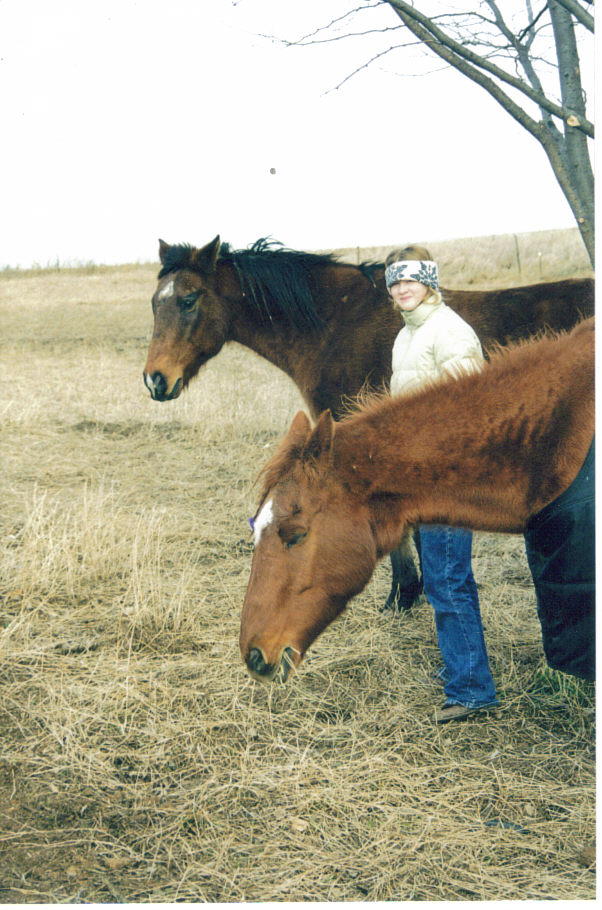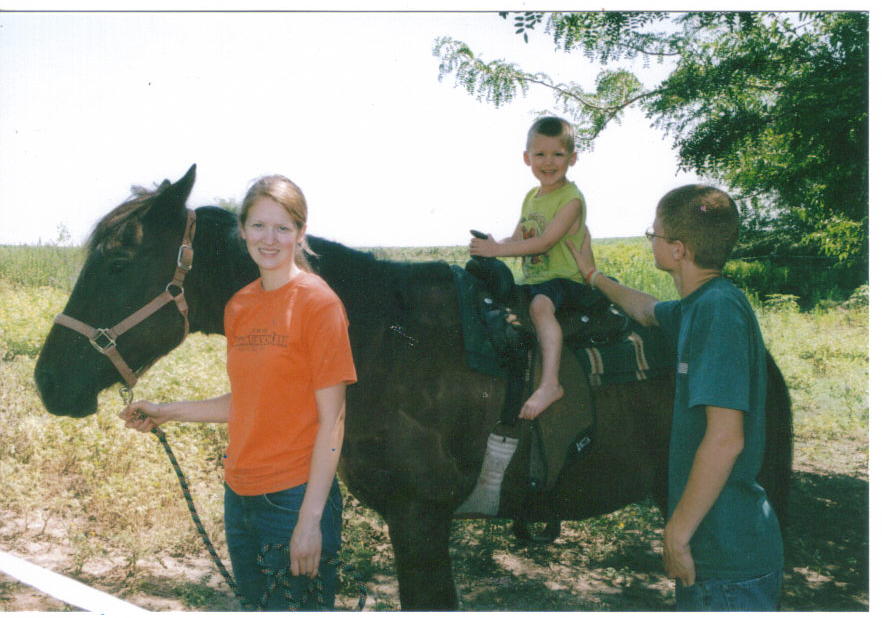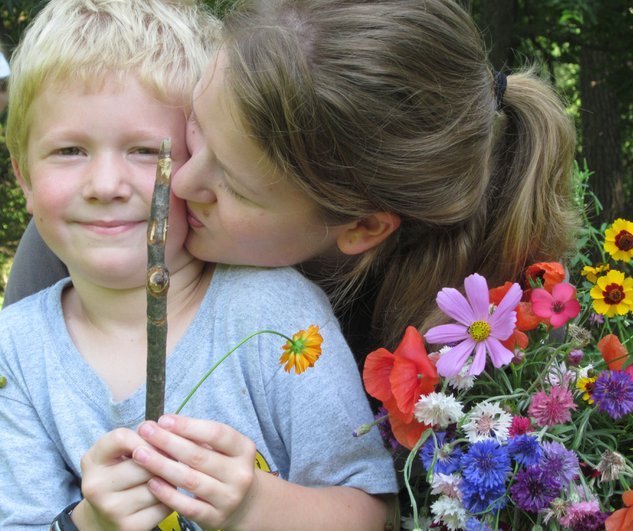Chasing horses on your feet will get you absolutely nowhere

Here’s Bethie with Romeo (in back) and her beloved Lacey.
As a little girl, daughter Bethany (now 21) began desperately pining for a horse of her own. Craving. Aching. Yearning. Bryan, in a moment of fatherly indulgence, if not wisdom, made a deal with her, a smart deal, he figured–an agreement that he didn’t figure he’d have to follow through on, truth is. He told her that if she’d earn and save the money to buy the horse, he’d pay for feed, fences, hay, etc. (Every time we share this story with a horse owner, he’ll snort and comment that she got the better end of the deal, and I concur, heartily.)
Why did my husband consider this a savvy move on his part, you ask, and well that you should. Bethie was 8 years old. She was a little girl! How could she earn, say, $1000.00, at least, to buy a horse? And how does a typical 8-year-old girl react whenever she gets a dab of birthday money, or finds a quarter on the sidewalk, or receives an allowance? She spends it, of course, on treats, candy, little gifts for her friends.
But as you might have guessed, our Bethie was not a typical 8-year-old girl. Her horse already richly formulated in her mind, with its soft velvety nose and its dark liquid eyes and its gleaming satin coat, she saved every bit of cash she could get her hands on. She did little chores around the house for pay. She started her own business, buying a heady selection of snacks and Little Debbie treats at Sam’s, then selling them to her willing brothers (and willing uncles, grandpas and grandmas, not to mention sympathetic passersby) for double the price. Her doting Grandpa aided and abetted, buying her large boxes of Little Debbies treats and donating them to the cause, and then buying them back from her, one by one. She made little marigold bouquets and sold them to people walking by our house. She got a paper route and roped her brothers into helping her with it. Not typical. And she didn’t spend a cent. She saved–patiently, steadfastly–every penny.
Bryan watched in increasing disbelief as her fortunes increased. One hundred dollars. “Two hundred dollars now, Daddy!” She’d proudly announce her bank balance from time to time. After a while, I made sure she came to me, and left Bryan ignorant of her savings amount, to try and save him the inevitable spasms and sick headache that would result.
As it happened, by the time we bought acreage a few years later (with room for a horse!) she had saved over a thousand dollars, plenty to buy a fixer-upper horse. Bryan took a deep breath (or several of them) and started to watch for sales on electric fence, t-posts, and hay, oh my! He did make a deal with his daughter, after all. He is a man of his word. And we started shopping for a horse.
Since my stories always run a little long, (I am my father’s daughter, I’ve discovered.) I’ll now skip over the months of horse-shopping. Some horsey friends could tell how clueless we were (it was obvious) and offered to help us, saving us lots of time and grief. By the way, if you know nothing about horses, make sure you glom yourself onto some horse-loving friends and learn from them, every step of the way. Your survival (and certainly your horse’s) may depend on it.
We ended up with two horses, actually. Bethie’s darling was an old mare named Lacey, quite thin, but well-trained for a beginning rider and part Arabian, and a beautiful runner. And we also bought a middle-aged quarter horse named Porkchop, to keep her company. Bethie right away renamed him “Romeo.” This still makes me smile, since he’s a gelding. (Look it up.)
Romeo is a big, strong bay quarter horse, beautifully muscled and a little stout. He has massive and well-shaped hindquarters. He can really run fast, too.

Bethie and Timothy here are taking their little cousin Orion for a ride on Romeo.
So we had horses! We were amazing. We were amazed. We never thought we’d ever be horse owners, but you know how it is when you’ve got children: you push and stretch and move out of your own personal comfort zone for them, even when you might not go to the same efforts for yourself. Even when you feel like you might be making a big, horrendous, insane mistake. You forge on, and hope for the best. So, we forged and hoped.
Still, proud and flush with horse ownership, and after shopping and researching and reading, we still didn’t know squat. Our horsey friends tried to educate us every time we were together. Better buy a blanket for Lacey, she‘s so thin she’s going to need one. Both your horses need their feet trimmed, here’s the number of our farrier. Have you done vaccinations yet? We’ve got extra doses we can sell you—you need help with the syringe? (cringe.) There’s an auction in Crete with hay—you might want to buy your winter’s supply now.
There’s a lot to learn about horses. And that doesn’t even begin to go into learning how to ride. There’s a lot to buy for horses, too, and Bryan was beginning to discover just how expensive this venture was going to be.
So we were learning, and it was really kind of exciting. It was a thrill to see Bethie riding Lacey, and oftentimes one of us would nervously get up on Romeo and go riding, too. Lacey was so well-trained that she could nearly read Bethie’s mind, and she was exceptionally patient with her. Romeo, on the other hand, was not pleased that he was being subjected to the efforts of rank amateurs, and he’d get frustrated, jerk his head and scare us silly. Nobody fell off. (Except for Andrew, that one time. . . but that’s another story. I promised you this wouldn’t be so long.)
So far, so good!
We set up a little pasture area on the west side of our property, where we’d take the horses to graze. Taking the lead of our friends, we put up a low electric fence with a single electric wire around the perimeter of the pasture. It didn’t look very secure, not very tall, but that’s what our friends would put up for temporary pastures. They said their horses were always so giddy when they were in the lush grass of the pasture that they didn’t notice the ineffectual fence. Still, that low fence made me a little nervous.
I think it made the horses nervous, too, especially one day when somebody from the road took a potshot at them. I couldn’t believe it. We heard the sounds of shooting, and we ran over to the pasture to check things out. Then we saw a pick-up truck on the road take off quickly, but I couldn’t watch it for the license number, because I couldn’t tear my eyes off of our horses.
“Horses are prey animals,” said the horse book I’d read. “Always wary of predators, they can be equally scared by a mountain lion or a bunny rabbit.” Or, understandably, by an idiot in a truck taking shots at them. Also, the book said that when horses are frightened, you can tell easily by their body language: ears pointed forward, heavy breathing from the distended nostrils, eyes opened wide, the entire body has a “heightened sense of alertness,” getting ready to flee from danger.
Lacey and Romeo certainly both had a heightened sense of alertness about them. “Whoa, look, Bethie!” I pointed out. “Heightened alertness—just like in the book!” Actually, I had never seen such terror. They fit the profile we’d read of scared-silly horses. And when we popped over the hill to check on them, that was it. That was the tipping point, apparently.
They both started galloping towards the north end of the pasture, away from the road and the scary sound. It was awesome to see. They looked like those pictures of wild stallions, wild and free, kicking up their heels. It still hadn’t entered my head that they would run off. We were there, after all, and we were their herd. They were safe with us, right?
Wrong. We only fueled their terror. They circled, gaining speed, then—to our horror–leaped over the minuscule fence. The yellow fence connectors popped up into the air as their feet struck the fence, and did a little dance before falling to the ground. I still see this moment in my head, in my nightmares, in slow motion—Romeo’s massive, beautifully-shaped rumpus taking off, as fast as he could go, and both horses leaping like massive gazelles over that pitiful little fence.
My immediate thought was “I’m never getting on the fellow again. Look how fast he can go.”
Bethie and I must have stood and stared at each other, open-mouthed, for a full thirty seconds after the horses disappeared over the hill, before we rushed into action. Just like that, our horses were gone. Trying to appear in control and knowledgeable about what to next (I spend a lot of time playing this part) I gasped “You go get halters and lead ropes, and I’ll run and take a nap. I mean, er, get some cracked corn.”
I really expected to find the horses up on the hill, or at least within sight, for pete’s sake. There were corn and bean fields all around our place, and surely the horses would be content to stop and nibble on the fresh greenery all around us. Right?
Wrong again. We raced up to the top of the hill behind our place and saw. . . nothing. No horses. Not for as far as our eyes could see. And we can see quite a fer piece from the top of our hill. We live in Nebraska, after all. They were gone, gone, gone.
Lesson 1 in horse ownership: “Chasing Horses on Your Feet Will Get You Absolutely Nowhere.”
Bethie and I stared at each other. We didn’t even have a horse trailer yet. How would we find them, and when we did find them, or if we did, how would we get them home? Dumb, dumb, dumb, that was us. How would the horses escape all the hazards around our place? Potholes, hidden barbed wire, electric fences everywhere. They were toast, it was certain. We were sick. They were probably dead already, or at least horribly maimed.
Yeah, I felt like an idiot—but it wasn’t the first time, and it probably wouldn’t be the last. We climbed into the Suburban and didn’t have to drive very far before we found them—they’d run until they had found a couple of other horses, at a neighbor’s place. (Oh yes, from the horse book—“Being prey animals, horses will always search out a herd when possible, as they feel safer in numbers.”) They were fine, calm, with no visible wounds or lacerations. Both still had all four legs attached. Both looked pretty invigorated, in fact, happy, with big horsey smiles on their smug faces. My thumping heart and prematurely grayed hair hated them for those smiles.
Bethie and Andrew led them home, on foot, and we learned our lesson: we got bigger posts and better wire and made a much more secure pasture before we let them graze down there, again.
Lesson 2:—If you’re going to keep horses, Put Up a Decent Fence! But, humiliation aside, no harm done. Onward and upward!
That’s why it was such a humiliating turn of events when they ran off again, only a couple weeks later. It was so silly: Bethie was leading both horses (she has two hands, after all) back to the paddock. Andrew popped out with the trash, and yelled at her. The horses took off. The hard lessons were coming fast now.
Lesson 3: One Little Girl Should Only Lead One Horse At A Time. What were we thinking?
This time, Andrew went along to round them up. We gathered up the necessary supplies, and I went into the house to get my keys. The phone was ringing.
My brother, Matt, was on the phone. “Ame, are you missing your horses? There are two horses over here, and they look a lot like Romeo and Lacey—they’re standing on the highway—but I’ll try to lead them off. . .” Matt and Paula live just on the other side of our section, and their property hugs the busy Highway 6. On the highway?! Sheesh!!
We hurried over, and were thankful to find them safely secured on my brother’s place, and not hurt. Not tangled in barbed wire or sporting gaping wounds. All our worst fears were for naught. Everything was fine. Onward, and . . . (gulp!) upward.

Here’s Bethie today, all grown-up, with little Mack.
Then Matt made the innocent observation that would serve to cost me many, many hours that weekend. He was fiddling with something on the ground. “Here’s your electric fence wire, Ame,” he said. “There’s lots of it—miles and miles–I’ve been trying to pull it off the highway for you.”
“But—“ I gasped, looking along the highway and seeing what looked like a massive, tangled, stretched-out slinky, running along Highway 6 as far as my bloodshot eyes could see—all the way to the cemetery, which must be nearly half a mile from Matt’s place.
“That’s not my fence wire,” I said, weakly.
Yes, Gentle Reader. Our horses had pulled out our neighbor Ryan’s electric fence, which he had put up carefully around his acres and acres of corn stubble, to keep his cattle in.
I was going to have to go call Ryan. His lovely black steers at the moment were probably running wild, and we were the cause. Perhaps getting killed, maimed or lost. Eaten by mountain lions. Our fault. My life seemed pretty bleak at that point. Why had we ever thought we could manage horse ownership? We were hopeless idiots.
Lesson 4: Hopeless Idiots Shouldn’t Own Large Animals!! They should stick with fish, or gerbils. At least small animals couldn’t do anybody else harm, they shouldn’t, anyway.
Matt offered his electric-fence winder-up apparatus, but since it was nearly dark, we decided to wait until the next day—Sunday—to wind up that fence and return it to Good Neighbor Ryan. Hopefully he’d not kill us, or sue us, or yell at us, or anything. We left the fence wire tangled up in a huge, hopeless pile, but at least it was off the highway!—and we headed for home. Andrew and Bethie led the horses, again, on foot.
I prepared my speech to Ryan all the way home, with dread, and feeble prayers. “Um, Ryan, our rascally horses did a wacky, silly thing—“ No, no. . . “Hey, Ryan! My sweet, little daughter’s horses ran off, and—“ Still not quite right–how about “Ryan, want to come over for dinner and oh, hey, I’ve got a funny story to tell you—“ Jeepers. It was impossible to phrase this correctly. Finally I settled on: “Ryan, what’s your favorite kind of pie? Fine, I’ll bake one and bring it over, and by the way—“ Homemade pie is a great catalyst for forgiveness, surely. Hopefully.
Ryan was as gentlemanly and sweet as he could be. This is what he said, and I’m not making this up. He said “Wow! That’s awesome! You just did me a great favor! I was just going to take that fence down next week, and your horses did it for me!” Weak with relief, I told him that we’d wind it up on a spool and bring it to his house the next day. If I hadn’t been a married woman and old enough to be his mother, I’d have covered him in kisses.
Next day, Andrew, Bethie and I gave up our Sunday afternoon leisure activities to untangle that wire and wind it on a spool. It took hours upon hours. Then, we went home and made pie for Ryan.
When we dropped the coil of wire at his place the next day (with the pie) he smiled gallantly. “Oh, you didn’t have to do that,” he said graciously, eyeing the huge, neat coil, and the fresh, hot pie. My mind flashed back to the miles of stretched-out giant slinky, then to the tangled, impossibly snarled wad of wire lying in the grass, the way it had been before we wound it up.
“Oh yes,” I said grimly. “We certainly did.”
Lesson 5 in horse ownership: Live Near Patient and Kind Neighbors.
And, for good measure, one more lesson in horse ownership:
Lesson 6: Learn how to make pie.
Ryan still mentions that pie, by the way, but I hope he has forgotten about the fence wire.
- Heirlooms, GMOs, Open-Pollinated, Hybrids . . . which do I choose?
- An adventure IN WHICH my neighbor’s steers and I share A Moment


What a hard working and dedicated young lady. Traits that will take her far, no doubt.
I didn’t realize that horse were prey animals. Interesting.
She is still a hard-working and dedicated young lady, pursuing a double major in Theatre and English! Thanks for your comment, Alessa!
This is really interesting and a good story. I know very little about horses, so I enjoyed hearing about your learning curve with them. And I liked how you ended it too. With pie.
Thanks for reading, Kate! I find that pie makes a suitable ending for most stories, don’t you?